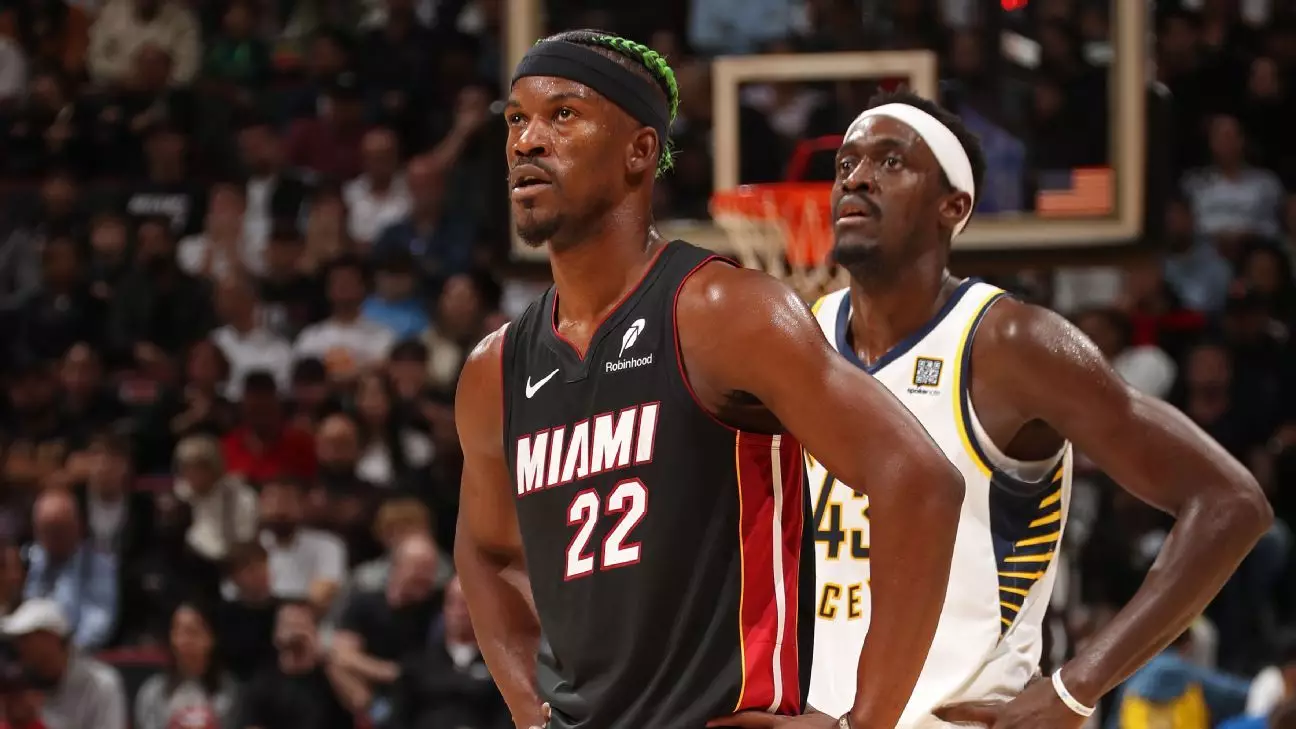In recent developments within the Miami Heat organization, six-time All-Star Jimmy Butler has reportedly expressed a desire to be traded, signaling a significant shift in both his personal and professional aspirations. According to sources close to the situation, Butler has made it known that he does not wish to play for the Heat any longer. Interestingly, he has opted not to provide a list of preferred teams, indicating a broad openness to any destination that could reignite his passion for basketball. This stance has raised eyebrows across the league, highlighting the complexities of team dynamics and player contentment in professional sports.
Butler’s comments following a disappointing 128-115 loss to the Indiana Pacers further shed light on his current state of mind. With only nine points and a notable absence from key moments in recent games, Butler articulated a profound loss of joy when it comes to his on-court performance in Miami. This sentiment is particularly telling as it reveals a potential rift between the player and the organization, one that might alter the trajectory of both Butler’s career and the Heat’s future.
The 35-year-old forward, known for his competitive nature and relentless work ethic, has described feeling disconnected from the very game he loves. “I’m happy here off the court, but I want to be back to somewhat dominant,” Butler lamented. His assessment, grounded in his lack of assertiveness on the court, is alarming considering his history as one of the NBA’s elite competitors. Butler’s recent performances raise an essential question about player motivation and the impact that management decisions can have on an athlete’s psyche.
An important factor in Butler’s decision is a perceived slight from team officials who suggested he was not exerting maximum effort during a recent win. This criticism seems to have struck a nerve with Butler, leading to a defensiveness about his commitment and competitiveness. He asserts that despite lower usage rates and fewer shot attempts, his effort level remains consistent. “You won’t say I’m not out there playing hard,” he stated defiantly. This pushback emphasizes the often-contentious relationship between athletes and team management, especially when expectations and perceptions do not align.
As Butler publicly displays dissatisfaction, the Heat’s management faces a complicated dilemma. Despite internal discussions about potential trade scenarios, team president Pat Riley has remained steadfast in his refusal to move Butler. This resistance creates a palpable tension that could lead to a standoff, potentially impacting the team’s chemistry and overall performance this season. Butler’s stance on seeking a trade is significant because it pushes management to either reconsider its position or risk the consequences of an unhappy star player.
Although Butler’s trade request is serious, he reportedly intends to remain committed to participating in team activities, underscoring his professionalism amidst the turmoil. This nuanced behavior reveals the complex nature of athlete negotiations, wherein personal ambitions must often be balanced with professional obligations. The situation echoes previous trade saga narratives in the NBA, where emotions clash with business decisions, setting the stage for potential drama as the season progresses.
A Turning Point or a Temporary Pitfall?
The Heat’s management and Butler’s representation have attempted to communicate and resolve the growing divide, yet reported efforts have not led to a fruitful resolution. The friction between Butler and the organization extends back to last season when Riley’s announcement regarding contract extension talks left Butler feeling undervalued. Such public declarations about player contracts can significantly impact morale within a locker room, sparking both frustration and confusion among teammates.
As Butler navigates the final year of a lucrative contract, averaging impressive stats and maintaining close to peak performance, the stakes for all involved parties remain high. The looming free agency also plays a role, as rumors suggest Butler plans to opt out of his contract next season. This potential move adds another layer of complexity to the trade discussions and management strategies that the Heat might employ in coming months.
The unfolding narrative of Jimmy Butler and the Miami Heat raises critical questions about player autonomy, organizational loyalty, and the intricate relationships that shape professional sports. As Butler seeks to reclaim his joy and purpose on the basketball court, both parties face pivotal decisions that could redefine the future of the franchise. Whether through a successful resolution within the Miami Heat structure or a necessary trade to ignite his career, the next steps for Butler will be closely scrutinized by fans and analysts alike. In a league where success is often measured by championships, the emphasis on player satisfaction becomes increasingly crucial in achieving collective aspirations.


Leave a Reply